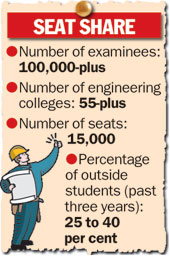 |
Outsiders will find it difficult to enrol in engineering colleges in the state.
Three years after introducing an “open-door” policy to attract brilliant students from across the country by conducting the Joint Entrance Examination (JEE) in Delhi, Mumbai, Chennai, Guwahati and Agartala, the government has decided to do away with examination centres beyond Bengal.
“Students from other states wanting to study in our engineering colleges will now have to come here to appear in the state JEE. A final decision on this score will soon be taken by the board,” said N.R. Banerjea, chairman of the state JEE board and the vice-chancellor of Bengal Engineering and Science University.
In 2004, the state government had scrapped the domicile clause from JEE application forms for engineering students and conducted the tests in big cities. In the past three years, around 25 to 40 per cent of the seats were occupied by students from other states.
But the open-door policy came under criticism last year when a section of teachers from engineering colleges complained about the quality of students from other states.
The Students’ Federation of India joined the chorus and highlighted the poor performance of some high-ranking students in their Plus II examinations and raised questions on the method of conducting examinations in outstation centres.
These questions, according to board sources, forced a review of the open-door policy.
But the official explanation is — administrative problems in holding examination in other cities.
“We needed 19 centres in Delhi for the 2006 examinations. But nine institutes backed out at the last moment and refused to allot us their premises,” said Banerjea.
The high cost of hiring examination centres has been cited as the other reason for not conducting the examination in other cities.
But some teachers argue that these administrative issues can be sorted out with efficient planning.
“A fool-proof examination method can ensure entry of brilliant students, which will benefit local students through enriched classroom interaction. The local industry will also benefit from the talent pool,” said an educationist.










